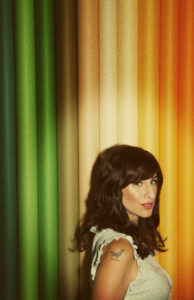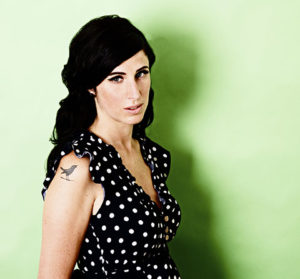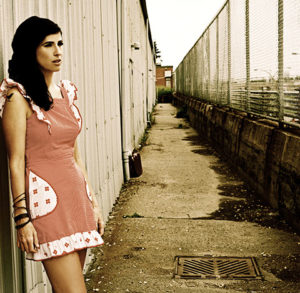
For nearly 12 years, Edmonton’s Ann Vriend has captivated audiences across Canada, and increasingly abroad, with her truly ingratiating personality, her dynamic, powerfully memorable musical compositions, and with her compelling, deeply melodic and breathtakingly expressive voice.
Since 2003, Vriend has released seven critically-acclaimed albums of insightful and highly original material, which have deftly traversed a number of genres as she has incorporated pop, soul, rootsy Americana, folk and tinges of alt-country into her musical melange. But it works, and has generated a robust and very loyal following of fans.
Her latest album, Anybody’s Different, is her first since signing with Toronto’s Aporia Records, and was released on May 5 with a packed release party taking place in her hometown on May 6.
Anybody’s Different is an extension of the more R&B-inspired direction that Vriend began exploring with her previous record, 2014’s For The People in the Mean Time. For music observers who may have missed it, it is a departure from some of her earlier releases, which were more rootsy, bordering on Americana.
“It’s definitely an R&B record which is borrowing from a lot of different decades and sounds within the R&B spectrum, but always from the perspective of my own lyric writing and my own struggles with issues and trying not to put them in simple, black and white terms. But I have always wanted to do that kind of music. My very first record [Soul Unravelling, released in 2003] is kind of a smattering of all these R&B and funk songs. But because of logistics, I ended up following the more acoustic, singer/songwriter kind of thing, playing in smaller rooms where that sort of music was appreciated,” Vriend said.
“I did what I guess you could call an Americana/Soul album in 2011 [Love & Other Messes] which was more of a Norah Jones take on Americana and soul in the same sort of country way that Ray Charles did it in the 1960s when he did his country albums. Soul and blues have always been in my music, but now I am doing it in a much more overt and aggressive way in terms of rhythm and drums being more prominent.”
What has never departed is Vriend breathtakingly melodic, soulfull and heart-stoppingly evocative voice. And it’s not just her literal voice, but the voice she uses as an artist, a lyricist and composer. That ‘voice’ is also increasingly lauded for its diversity of tone, its sense of artistic wanderlust, but also the way it all comes together into a unified whole that is often mesmerizing and truly penetrates into ones soul and psyche.
 “People do tend to recognize me when I am singing. I have been singing in a bar or club with the door open to the street and people would say they came from blocks away because they thought they heard my voice. Like many artists I like to experiment with a fairly broad palate with my production and my writing style. But I hope that there is a common thread and I think I have carried a lot of fans throughout my career who seem not to be bothered by this hunger to try new things. They allow me to experiment as an artist rather that put me in a very, very tight, closed-in box.”
“People do tend to recognize me when I am singing. I have been singing in a bar or club with the door open to the street and people would say they came from blocks away because they thought they heard my voice. Like many artists I like to experiment with a fairly broad palate with my production and my writing style. But I hope that there is a common thread and I think I have carried a lot of fans throughout my career who seem not to be bothered by this hunger to try new things. They allow me to experiment as an artist rather that put me in a very, very tight, closed-in box.”
As for her writing process, Vriend said there are certain aspects that have evolved over time, but some that have remained remarkably entrenched.
“I have had the same writing style forever. I recently went back to listen to some of my early stuff and though some of it made me cringe in that obviously I still had a few things to learn, there was a definite style that I had a long time ago and I haven’t really deviated from it,” she explained.
“I have honed certain things but I think that perspective and the same way of tackling certain kinds of topics haven’t really changed. Which is kind of a weird thing to discover because I thought I really had; I thought I had gotten wiser but I guess I really didn’t in some ways.”
Writing has been a way for Vriend to process the thoughts, feelings and experiences of her life, particularly the dramatic and traumatic ones. Sometimes the music comes together quite randomly, but other times she gets a fixed theme or specific notion in mind and sets down to put the pieces in place both musically and lyrically.
“I sometimes jot notes down into my phone or on scrap piece of paper. But other times I start a song by just singing a wordless melody while I am doing the dishes or something, later harmonizing at the piano. And then I start singing nonsense words and eventually a real word comes up and it’s all just based on the sound of it. The in my subconscious it becomes an actual idea and a song about something,” she said.
“At other times I will really set out to write a song about a topic that’s on my mind, but I kind of like to change it up so I am not just writing the same song over and over again; I am trying to get at the same thing from different angles. I mostly write from the detail in, if that makes sense. I will have this weird line that’s cool and I don’t even know why, and then I write around it and then next thing I know I have a song. I then look at the song from a whole other side of my brain, the analytical and cognitive side of my brain and go, ‘huh, I guess I was thinking about that and I guess the song is about that.’
“But it’s weird in that I have always found my writing to be really revealing about what’s going on in my mind because apparently I am not completely in touch with myself. Especially when I was a teenager, songwriting was a real sort of angst relief.”
Relationship – the good, the bad and the ugly – are at the heart of much of Vriend’s source material, but the subject is handing in a more introspective way than in most songs these days. The tone and thoughts reveal an understanding that relationships are complex, people are complex and that as with so many things in life, simplistic answers to intricate scenarios are rarely compelling and rarely honest when transmitted through the vehicle of a song.
 “Even when I was younger I was already going through a lot of serious relationships and serious relationship break-ups. But I have never been really comfortable with the finger pointing and demonizing of anybody – the other person – no matter who they are. Even then I sort of realized there is more tragedy in the situation than there is blame and scapegoating, and the black and white mentality really doesn’t hold true. When I look back on my own experiences and how I have processed them through my writing, it’s never like ‘oh, these people are bad and we are good,’ – all that echo-chamber, preaching to the choir propaganda. I always bristled at those kinds of observations and those kinds of songs. It didn’t seem real and it didn’t feel comfortable on me, like an ill-fitting shirt or something,” Vriend explained.
“Even when I was younger I was already going through a lot of serious relationships and serious relationship break-ups. But I have never been really comfortable with the finger pointing and demonizing of anybody – the other person – no matter who they are. Even then I sort of realized there is more tragedy in the situation than there is blame and scapegoating, and the black and white mentality really doesn’t hold true. When I look back on my own experiences and how I have processed them through my writing, it’s never like ‘oh, these people are bad and we are good,’ – all that echo-chamber, preaching to the choir propaganda. I always bristled at those kinds of observations and those kinds of songs. It didn’t seem real and it didn’t feel comfortable on me, like an ill-fitting shirt or something,” Vriend explained.
“I always stepped back to ask why. What is really happening here? Why are we hurting each other? Relationships, even in the more stark of circumstances, aren’t black and white. There are other factors from outside that impact the relationship. There are no simple answers, but when there is a break up, it’s painful and complicated because there is always some longing and love still there.”
Anybody’s Different is a clever turn of phrase that embodies what Vriend has been talking about in reference to her songwriting and outlook on relationships and life. For her, it’s about asking the deeper questions and not being satisfied with simple platitudes or juvenile, one-sided angst that often manifests in the typical pop break-up song.
“I am all for being angry and empowered because people need to be empowered, but I don’t think it’s just one kind of people and one gender. I don’t think one’s empowerment should be at the expense of another’s, ever. And that’s sort of my perspective on everything. I don’t want to just preach to the demographic I happen to be part of because of how I was born or where I was born. I don’t want to just be relevant to people of my economic class or people of the same skin colour, my gender grouping or ethnicity – not that I have any problem with people who do speak directly to people that they belong to in that way. But for me, I am not really very interested in the tribalism of all that,” she said.
“That’s what the title of the EP is. That’s the whole point of it. And I insisted that the title track was the first song to be released back in September which, to their credit, the label went along with even though in terms of a commercial single, it’s not one at all. But I wanted it out in the lead-up to the U.S. presidential election because I really felt people there, and in other parts of the world, were dividing themselves up more and more into groups us and them. There were all these dehumanizing views of the ‘other’ no matter who that other was. There was the mentality of only hearing people who agreed with you and shutting out everybody who didn’t, and thinking that was a new, enlightened way of doing things in the world.
“I thought this was bad and I think it’s going to get us into a lot of trouble. And so the whole point of the song and the whole point of the EP, and maybe inadvertently the whole point of what I do as a writer, is point out the humanity across the board that we share and to not forget that as much as we can. Using the word anybody as opposed to everybody did lead people to call me out saying it was grammatically incorrect. First of all, that’s anal retentive and, second, I did it on purpose. We all have things the same as the group or tribe with whom we associate – things that are not our choice, such as skin colour. But we also have ways that we don’t fit those stereotypes in that we are ourselves, we are individuals. We are more than a number. We are more than a demographic. We are more than a market or a statistic, each one of us. My overarching message is, ‘hey guys, how about we treat each other like human beings.’ Isn’t that how we’re supposed to be different from the animals of the world by having a moral conscience and compassion?”
 Anybody’s Different was released earlier in the spring in Australia, which has become one of Vriend’s most popular markets.
Anybody’s Different was released earlier in the spring in Australia, which has become one of Vriend’s most popular markets.
“I think it was my 12th or 13th trip down there that I did this past February and March. I have a separate label down there that represents me so they have this annual tour and promotion of my music built into my life. I have gone other places but for some reason it’s really worked out for me down there. Having my music on the radio and building a fan base by going down there year after years has worked. I think it helps that It’s also an English-speaking country and my lyrics are better understood,” she said.
“Honestly, I would say it’s hard to make it anywhere – in any country. You have to take advantage of every opportunity that comes your way and keep pounding away until you start to build a reputation and an audience. In the States you don’t have the challenges of the big distances in between cities like you do in Canada or Australia, but you have the challenge of dealing with 10 times the number of bands and artists. So there are plusses and minuses for each country.
“Germany is another place where I seemed to have developed a following. It’s a place that, at the moment, is fairly easy to tour and people there are willing to take a chance on a new artist. A lot of the time there is the opposite mentality in North America, but over there they are excited to go see someone who isn’t already heard of because they want to discover it for themselves. That’s an awesome attitude for artists when they’re starting out because everyone has to start somewhere. The Beatles weren’t famous from the beginning.”
For most of May, Vriend will be in Germany and neighbouring Austria before returning to Canada for some dates in Alberta in June and July. For more information on the EP and her tour dates, visit www.annvriend.com.
- Jim Barber is a veteran award-winning journalist and author based in Napanee, ON, who has been writing about music and musicians for a quarter of a century. Besides his journalistic endeavours, he now works as a communications and marketing specialist. Contact him at jimbarberwritingservices@gmail.com.
